Overview
The article underscores the critical necessity of establishing accuracy benchmarks for startup datasets, which are essential for sales leaders to effectively drive their strategies and enhance performance. High-quality, accurate, and relevant data is not just beneficial; it is crucial for startups aiming to improve lead generation, decision-making, and operational efficiency. This necessity is further bolstered by the integration of advanced AI tools and stringent validation practices.
In today’s competitive landscape, the reliance on precise data cannot be overstated. Startups must recognize that the foundation of successful strategies lies in the integrity of their datasets. By prioritizing accuracy, they set the stage for informed decisions that propel growth and efficiency.
Moreover, the implementation of rigorous validation practices ensures that the data remains relevant and actionable. This approach not only enhances operational workflows but also supports the development of innovative solutions that can adapt to market demands.
Ultimately, the journey towards data excellence requires commitment and a strategic focus. Sales leaders must champion the establishment of these benchmarks, fostering a culture that values data integrity as a cornerstone of their operational success.
Introduction
In an increasingly data-driven world, the accuracy of startup datasets has become a pivotal factor for sales leaders striving to enhance their strategies and drive growth. Understanding the benchmarks that define data accuracy empowers these leaders to make informed decisions, ultimately influencing their revenue performance.
However, with a vast array of available data sources and the inherent challenges of maintaining quality, how can startups ensure that the information they rely on is both trustworthy and actionable? This question is crucial as it sets the stage for a deeper exploration of data integrity in the startup landscape.
Websets: AI-Driven Accuracy Metrics for Startup Datasets
The platform harnesses advanced AI algorithms to deliver datasets that are not only accurate but also tailored to meet the specific needs of sales groups. Our AI-driven lead generation and candidate discovery solutions empower startups to pinpoint potential leads and qualified candidates based on highly specific criteria. This process enhances information with essential details, including emails, company specifics, and professional backgrounds.
By prioritizing the accuracy benchmarks of startup datasets and utilizing features like the Fast API and Research Agentic API, Websets equips startups to make data-driven decisions that can significantly influence their revenue performance. This commitment to precision fosters confidence in the information used by sales executives, leading to more effective strategies and improved conversion rates.
As noted by industry specialists, precise information is crucial in prospect generation. One sales executive aptly stated, 'Without trustworthy data, our strategies are built on sand.' This highlights the imperative for startups to leverage accurate B2B lead generation statistics to boost their operational efficiency and drive growth.
Moreover, our sophisticated AI-driven search engine is designed to handle complex inquiries, ensuring that teams can access unique insights that other tools may overlook. AI-native tools in CRM have been shown to provide a tenfold increase in productivity, underscoring the tangible benefits of having precise information.
To maximize these advantages, sales leaders must establish robust accuracy benchmarks of startup datasets in their lead generation strategies, ensuring that their information sources are reliable and tailored to their specific needs.
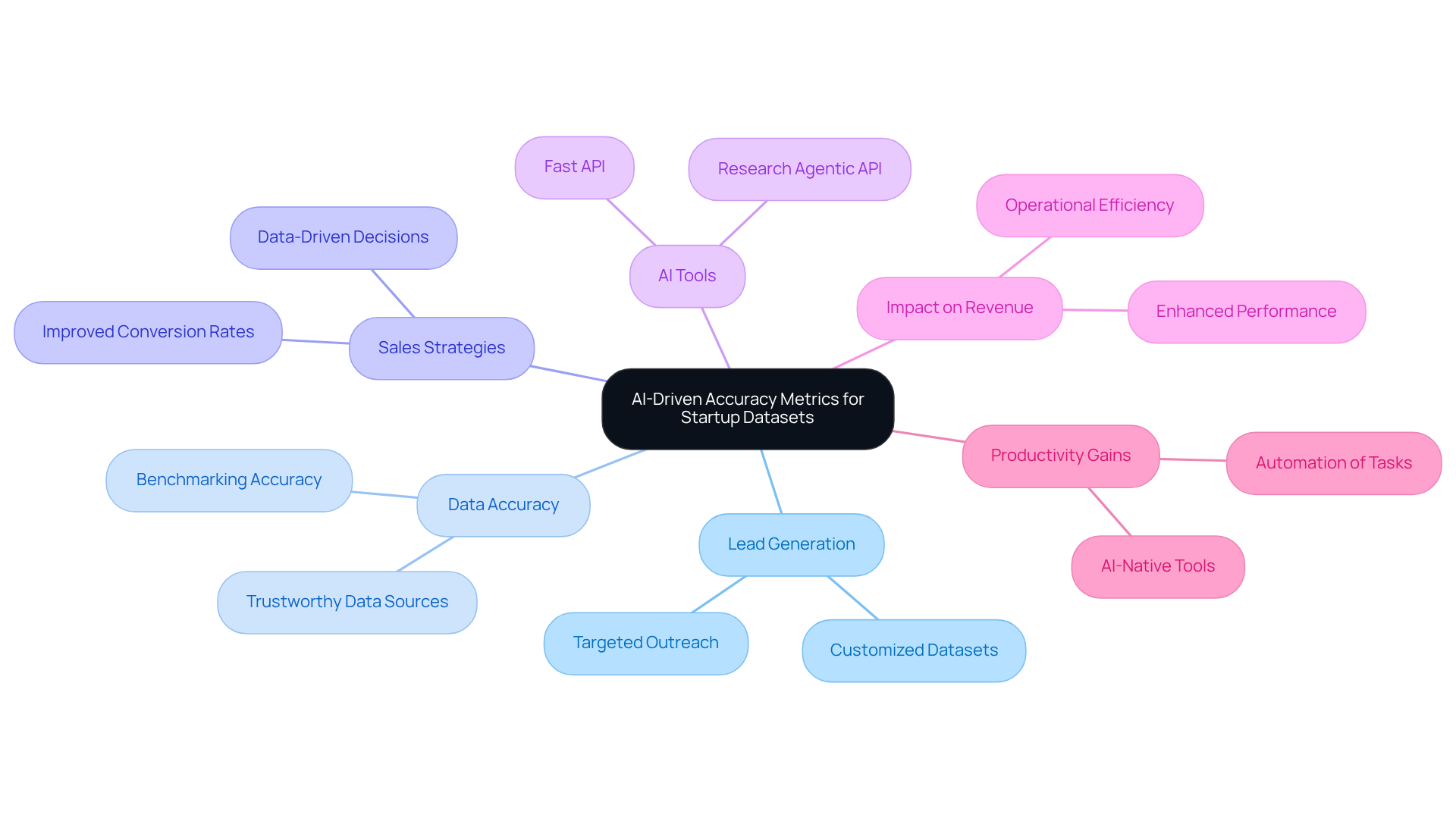
Data Quality: The Foundation of Reliable Startup Datasets
Data quality is paramount, encompassing accuracy, completeness, and reliability. For startups, maintaining high information quality is essential to meet the accuracy benchmarks of startup datasets, as it directly influences their ability to identify and engage with potential clients. Sales leaders must conduct regular audits of their information and leverage platforms that ensure consistently high-quality datasets.
By utilizing online platforms for comprehensive market analysis—recognizing prominent firms and gaining technological insights—sales teams can significantly enhance their effectiveness and operational efficiency. This approach not only streamlines processes but also empowers teams to make informed decisions that drive growth.
In an ever-evolving marketplace, the need for precise and reliable data, especially the accuracy benchmarks of startup datasets, cannot be overstated. Startups that prioritize the accuracy benchmarks of startup datasets position themselves for success, enabling them to navigate challenges and seize opportunities with confidence.
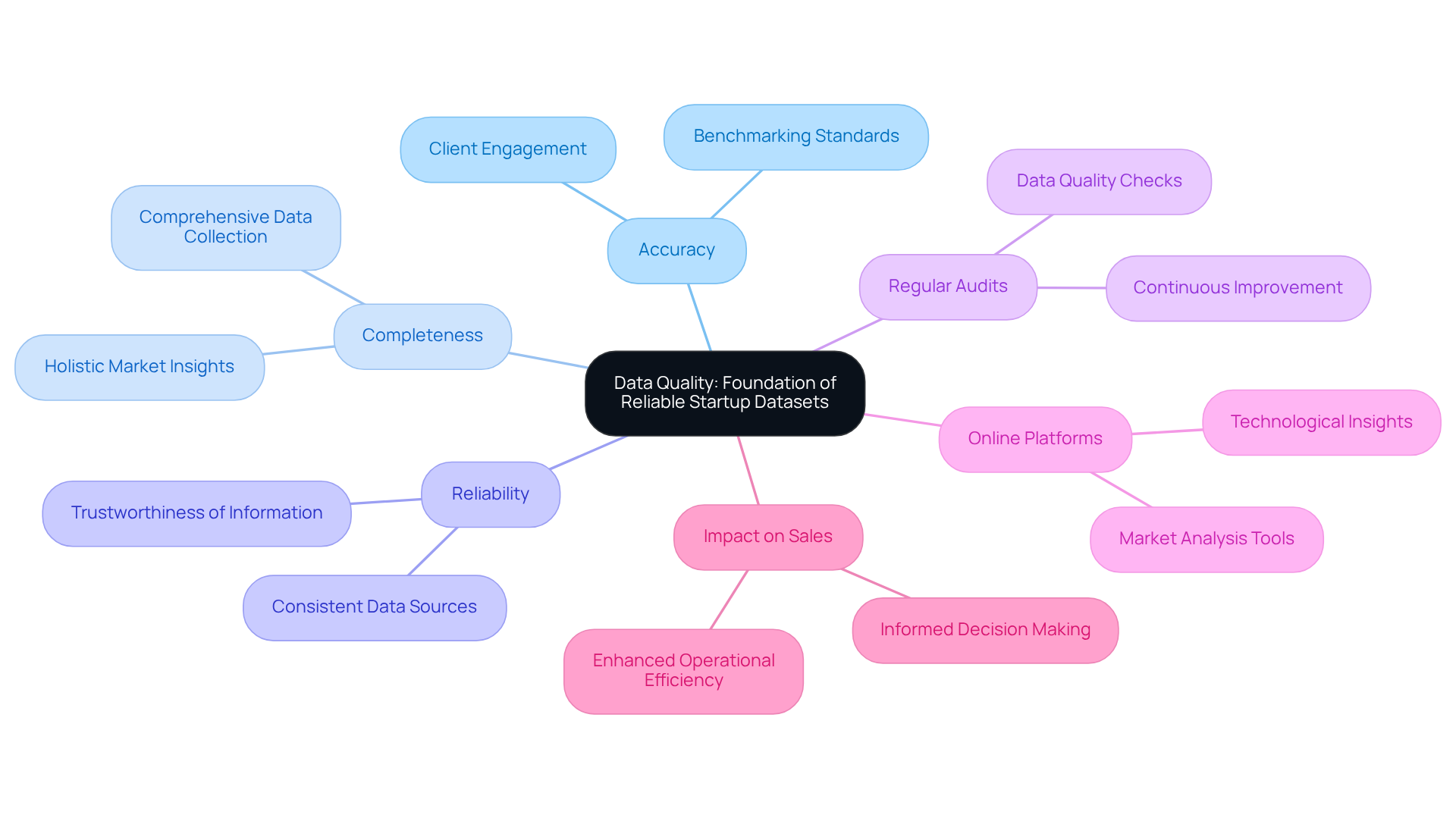
Data Completeness: Ensuring Comprehensive Insights for Startups
Information completeness is crucial—it defines the extent to which all necessary information is present. For startups, complete datasets are critical in meeting the accuracy benchmarks of startup datasets, enabling a nuanced understanding of customer behavior and market dynamics. Sales leaders must ensure that their information sources, particularly online platforms, provide comprehensive insights that cover all relevant aspects of their target audience. This enables more effective outreach and engagement.
Consider the impact of having complete information, which empowers startups to make informed decisions that align with the accuracy benchmarks of startup datasets and resonate with their customers. By leveraging detailed insights, businesses can tailor their strategies to meet the specific needs of their audience, ultimately driving growth. Are your current information sources sufficient to achieve this?
To foster deeper engagement, sales leaders should prioritize the collection of robust data. This not only enhances their understanding but also positions them to connect more authentically with their audience. In an era where information is abundant, ensuring its completeness is not just beneficial—it's essential for success.
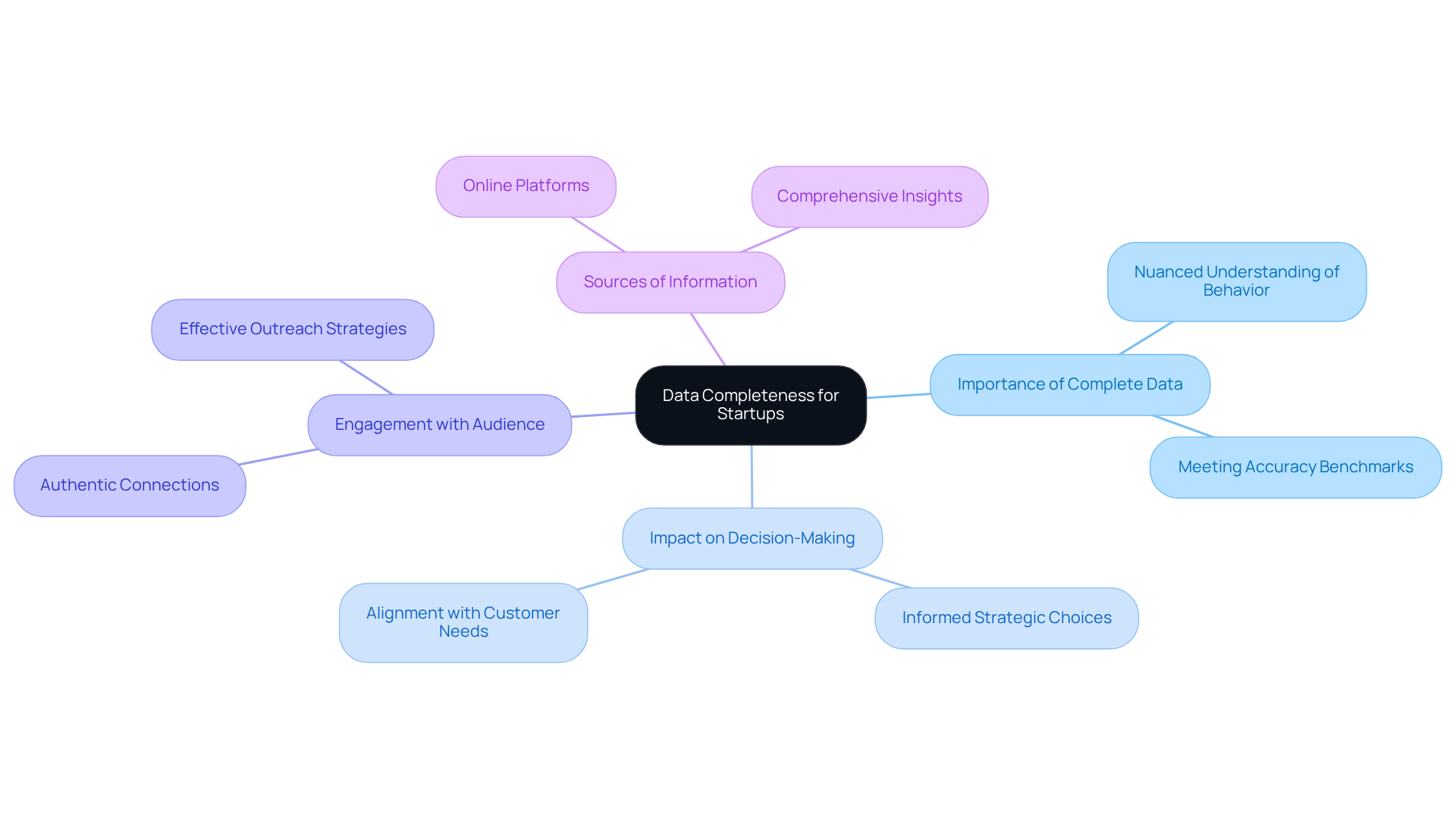
Data Timeliness: The Impact of Current Information on Startup Success
Data timeliness is critical; it defines how current and relevant the information is. In the startup ecosystem, having access to the latest data is essential to achieve the accuracy benchmarks of startup datasets, which can mean the difference between seizing a valuable opportunity and missing out entirely. Sales leaders must prioritize datasets that meet the accuracy benchmarks of startup datasets and are routinely updated, ensuring their strategies are grounded in the most current information available.
This company excels in delivering such timely insights through its enterprise-grade, AI-powered search solutions. With features like the Research Agentic API and tailored semantic search, this platform empowers sales teams to uncover unique and niche information that competitors often overlook. This capability significantly boosts prospect generation and recruitment efforts, positioning sales teams for success in a competitive landscape.
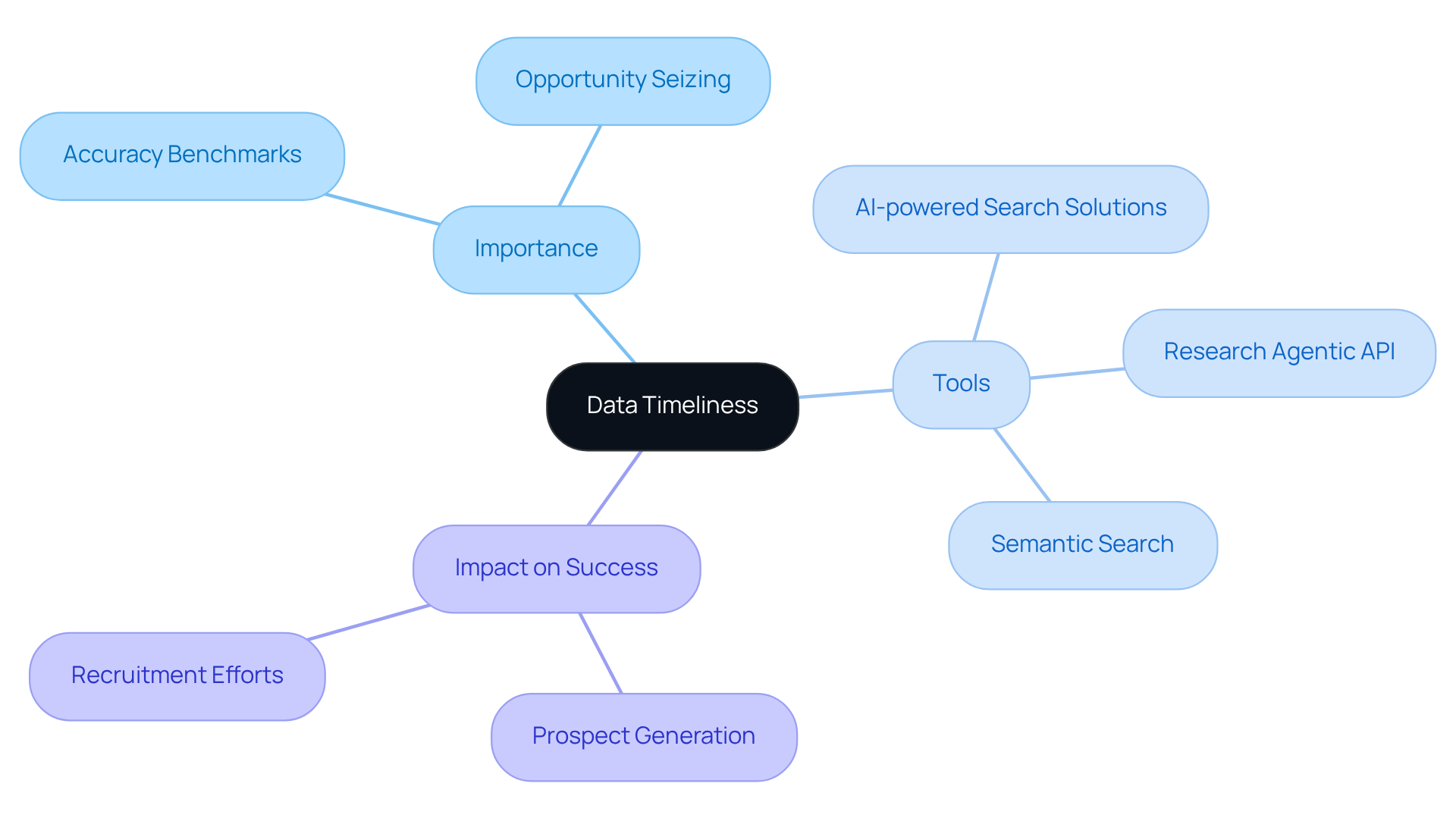
Data Consistency: Maintaining Integrity Across Startup Datasets
Data consistency is crucial for ensuring that information remains uniform across various datasets and platforms. For startups, maintaining this consistency is essential to uphold the accuracy benchmarks of startup datasets and prevent discrepancies that can lead to poor decision-making. Sales leaders must establish robust data governance practices and leverage tools that provide AI-driven B2B lead generation and people search solutions, ensuring their datasets remain consistent.
Consulting user manuals can provide valuable insights on effectively getting started with these platforms. By utilizing comprehensive market research tools—such as identifying notable companies and gathering tech insights—teams can significantly enhance their operational efficiency.
Ultimately, prioritizing data consistency is not just a technical necessity; it’s a strategic imperative that empowers startups to make informed decisions and drive growth using accuracy benchmarks of startup datasets.
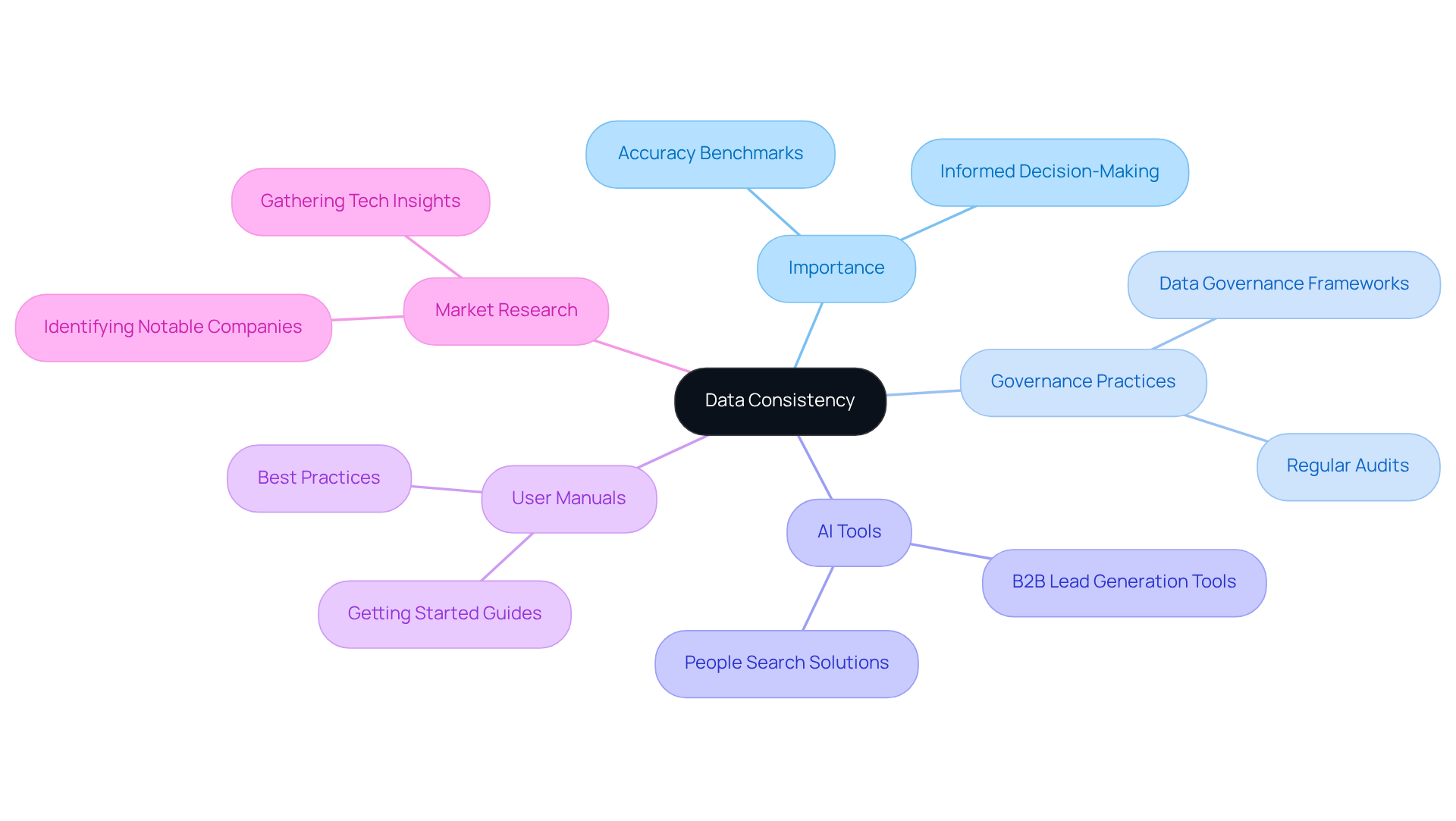
Source Accuracy: Evaluating the Trustworthiness of Startup Data
Source accuracy is paramount in evaluating the reliability of information origins. To achieve the accuracy benchmarks of startup datasets, startups must prioritize datasets from reputable sources, ensuring that the information they utilize is trustworthy. Sales leaders can leverage AI capabilities to assess the precision of their information sources, building strategies on a solid foundation of reliable insights.
Moreover, with Websets' Comprehensive Data Processing Agreements, enterprise clients can be assured that their information management adheres to stringent security and compliance standards, including SOC2 certification. This commitment to dependability not only enhances B2B lead generation but also facilitates efficient recruitment and information analysis. As a result, sales teams are empowered to make informed decisions that drive success.
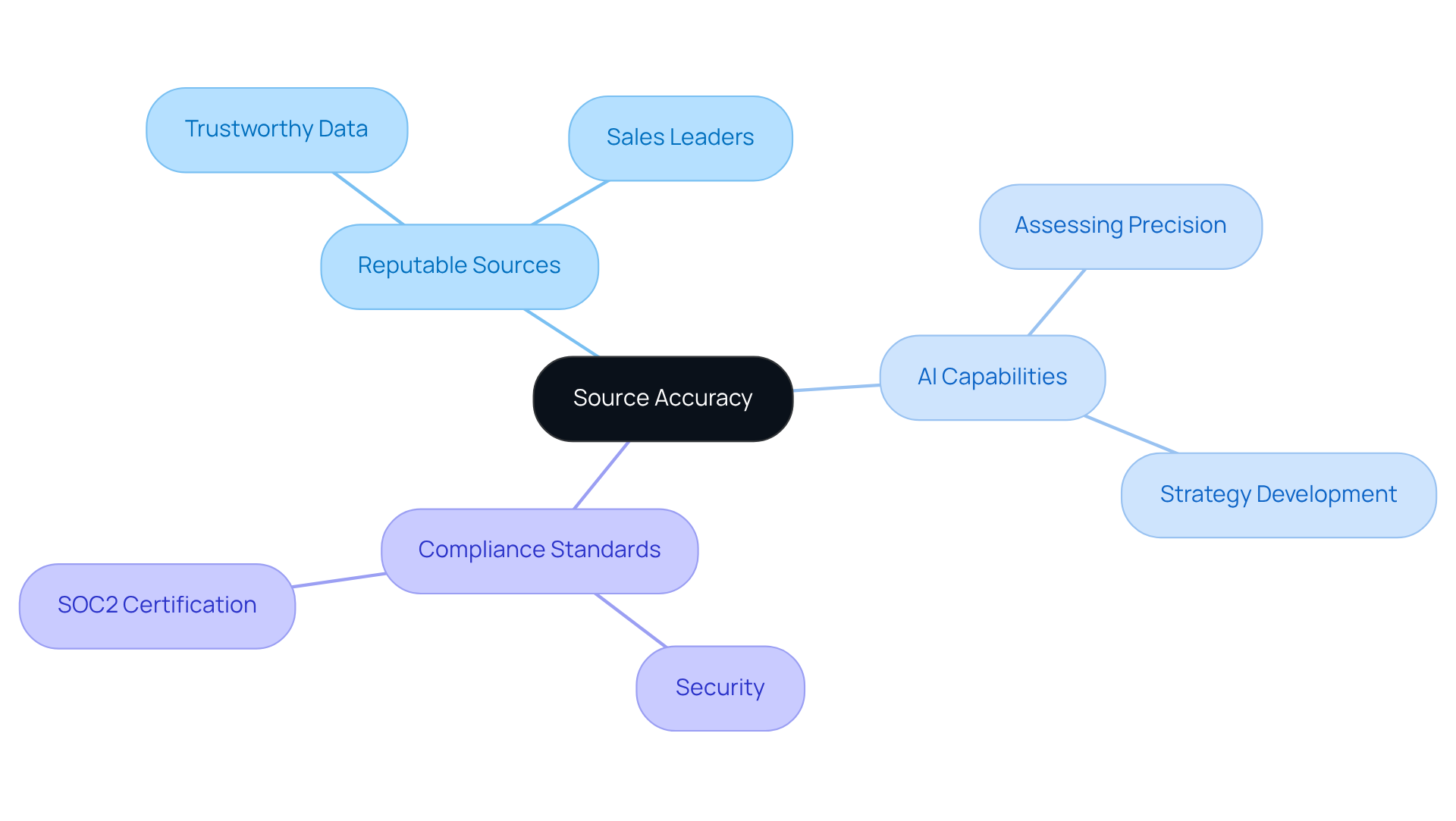
Data Relevance: Aligning Insights with Startup Objectives
Data relevance is crucial—it determines how well information aligns with the specific needs and objectives of a startup. Revenue leaders must focus on acquiring datasets that provide insights directly relevant to their business strategies. By utilizing an advanced AI-driven search engine, they can ensure that the information at their disposal is not only accurate but also pertinent to their goals.
The company offers enterprise-level, AI-powered web search solutions designed to enhance data exploration and technical insights. This enables sales teams to create opportunities with precision. With flexible high-capacity rate limits and premium support, this platform empowers sales leaders to refine their datasets for targeted results.
For instance, businesses have successfully leveraged online platforms to identify high-potential prospects and streamline their hiring processes, showcasing the system's effectiveness in practical applications. Furthermore, the API functionalities of Websets facilitate seamless integration into existing workflows, significantly enhancing the prospect generation process.
Data Granularity: The Importance of Detail in Startup Datasets
Data granularity is crucial for startups, representing a transformative factor in prospect targeting and segmentation. By harnessing detailed information, business leaders gain precise insights into potential prospects, facilitating customized outreach initiatives that resonate with specific audiences. Alarmingly, statistics reveal that enterprises lose approximately three trillion U.S. dollars annually due to poor information quality, underscoring the necessity for high-quality, detailed datasets. Startups that leverage the accuracy benchmarks of startup datasets can significantly enhance their revenue effectiveness, as it enables real-time assessments of marketing performance and swift identification of successful strategies.
Consider companies that have adopted comprehensive information practices; they report improved targeting that aligns with accuracy benchmarks of startup datasets, which leads to higher conversion rates. Sales leaders assert that access to detailed information about leads—such as their preferences and behaviors—fosters more personalized communication, ultimately enhancing engagement and retention. The platform provides tools that elevate information granularity and the ability to uncover niche results that other search engines overlook, empowering sales teams to refine their strategies based on in-depth insights. Moreover, Websets' robust security framework and compliance standards ensure that sensitive information is handled with utmost care. By concentrating on high-impact audiences with the right message at the right time, startups can optimize their marketing budgets and achieve superior outcomes in their lead generation efforts.
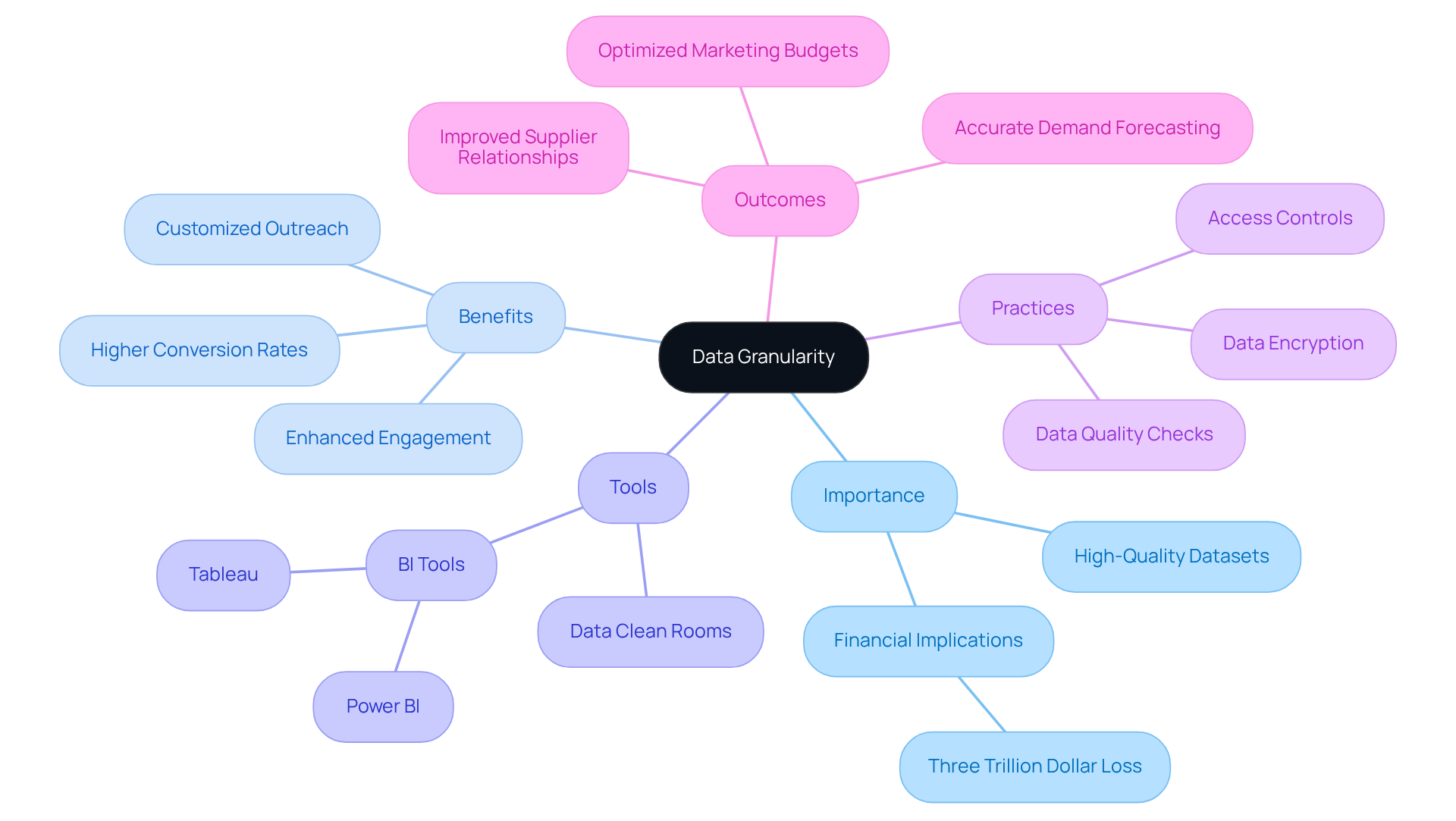
Data Validation: Ensuring Accuracy Through Rigorous Checks
Data validation is essential for ensuring the accuracy benchmarks of startup datasets, particularly in the dynamic landscape of startups. Stringent validation checks are not just beneficial; they are essential for ensuring the accuracy benchmarks of startup datasets, guaranteeing that the information utilized is both reliable and actionable. Startups that adopt systematic verification processes frequently observe substantial enhancements in their operational efficiency.
Sales leaders can leverage Websets' AI-driven validation tools, supported by comprehensive Processing Agreements, to uphold high standards of information integrity. This commitment directly translates into improved effectiveness in sales strategies. By prioritizing information validation, organizations can mitigate risks associated with erroneous data while simultaneously boosting outcomes in lead generation and customer interactions, ultimately aligning with the accuracy benchmarks of startup datasets.
Furthermore, delving into Exa's functionalities through user manuals can provide additional insights into refining information validation processes. Consider this: how much could your organization gain by investing in robust validation practices?
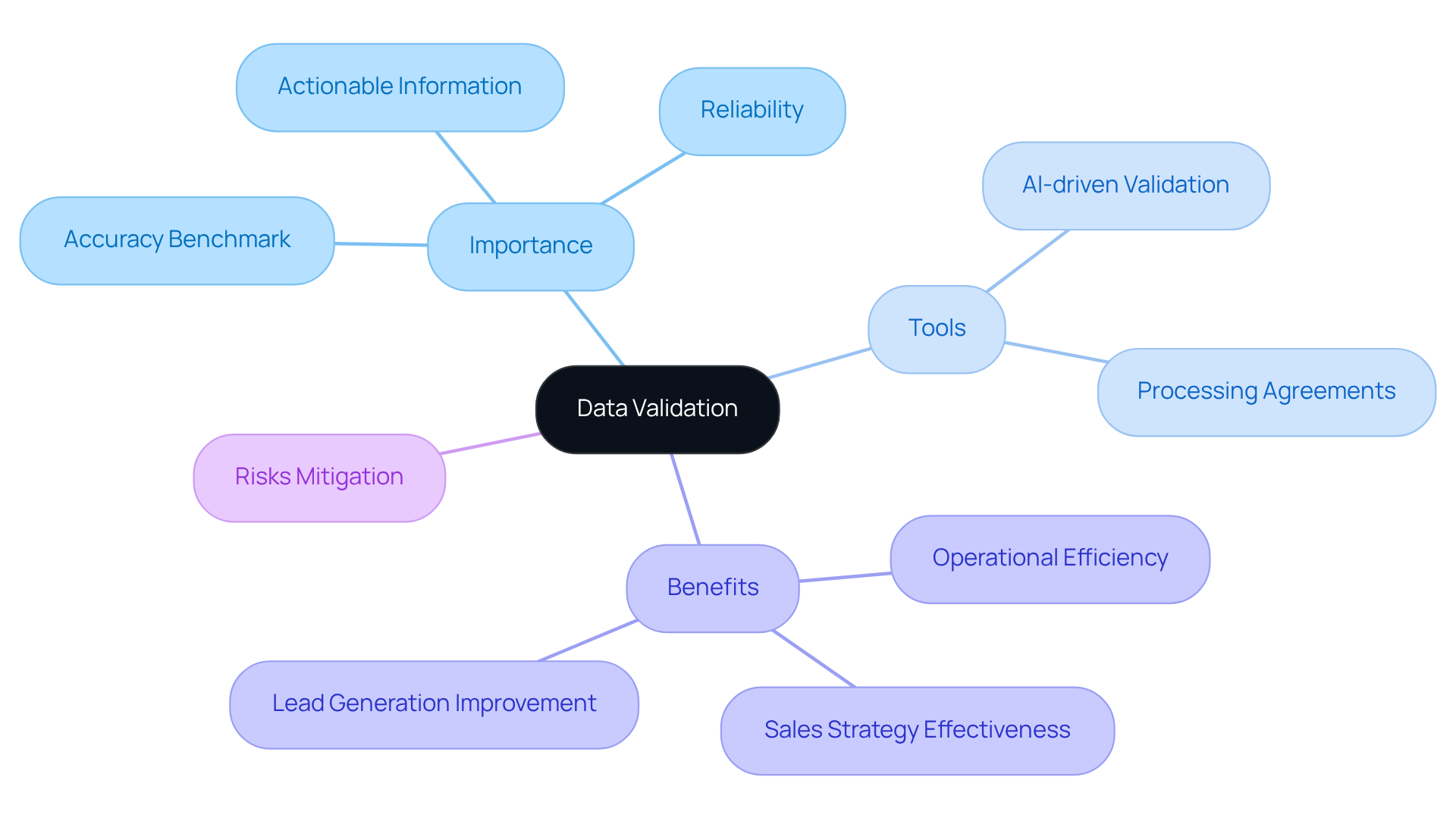
Benchmarking Practices: Comparing Startup Datasets to Industry Standards
Benchmarking practices are crucial for assessing the quality and effectiveness of startup datasets by comparing them to the accuracy benchmarks of startup datasets, as they allow for evaluation against established industry standards. Sales leaders must consistently evaluate their datasets to ensure they meet or exceed the accuracy benchmarks of startup datasets. Notably, statistics reveal that individuals spend 60% to 80% of their time searching for information, underscoring the necessity of accessible datasets.
By leveraging tools such as similar platforms, sales teams can gain valuable insights into how their information aligns with industry standards, fostering continuous improvement in their selling strategies. For instance, case studies have shown that enhancing data accessibility through Websets can significantly elevate productivity and decision-making.
To implement benchmarking practices effectively, sales leaders should identify key performance indicators relevant to their datasets. Regularly comparing these metrics against industry standards is essential, ensuring that they are not merely meeting expectations but consistently exceeding them.
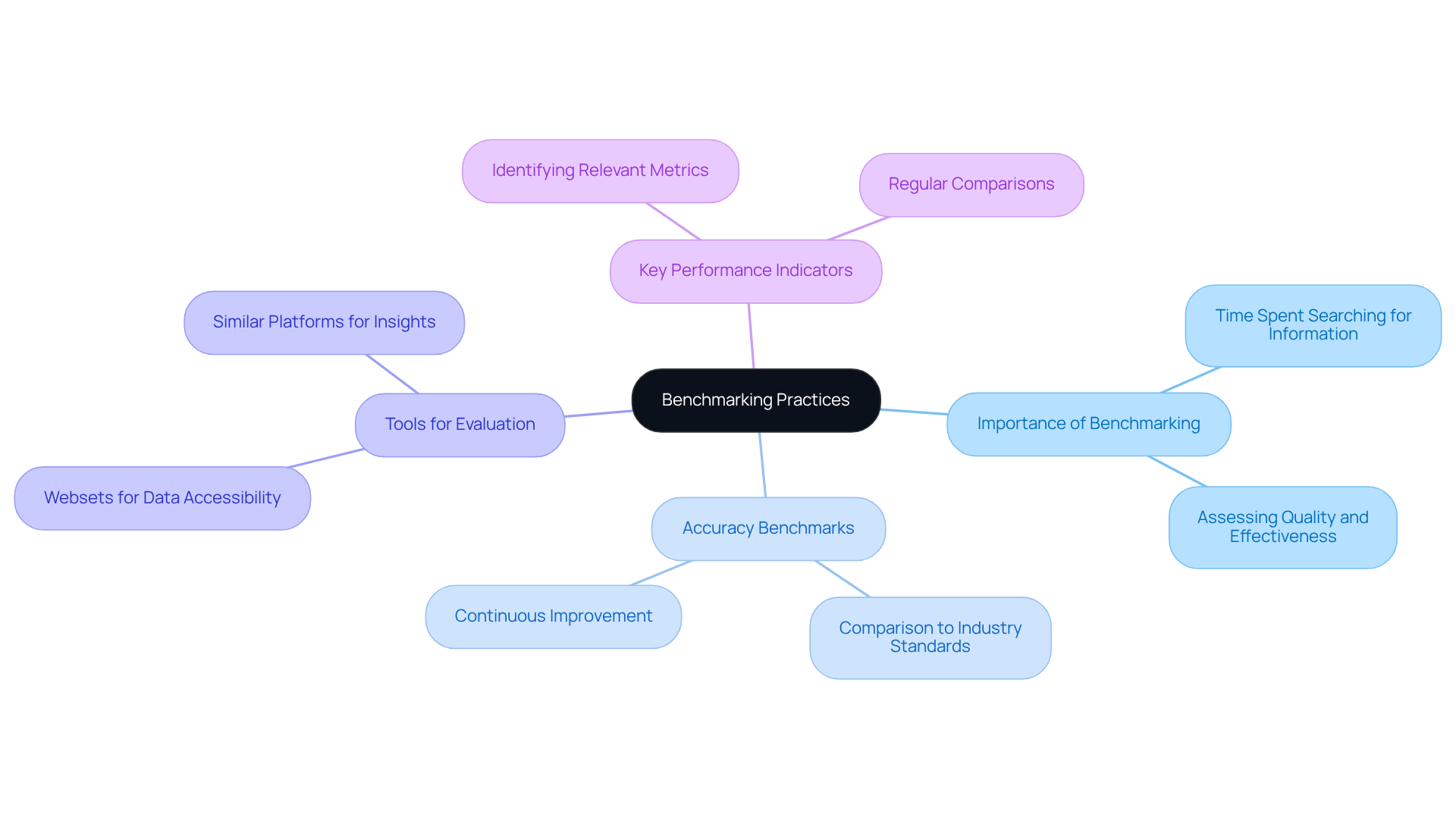
Conclusion
In the competitive landscape of startups, the accuracy of datasets transcends mere technical requirement; it is a strategic necessity. Establishing and adhering to robust accuracy benchmarks empowers sales leaders to equip their teams with reliable, actionable insights that drive effective decision-making and foster growth. This unwavering commitment to data precision is essential for navigating market complexities and capitalizing on opportunities.
Key themes explored throughout the article—data quality, completeness, timeliness, consistency, source accuracy, relevance, granularity, validation, and benchmarking—each play a crucial role in shaping effective sales strategies. Startups prioritizing these accuracy benchmarks position themselves to enhance operational efficiency, improve engagement with potential clients, and ultimately achieve higher conversion rates.
The importance of maintaining high standards for data accuracy cannot be overstated. As startups evolve, the ability to leverage precise and relevant information will be a defining factor in their success. It is imperative for sales leaders to adopt best practices in data management and validation, ensuring that their strategies are built on a solid foundation of trustworthy insights. By investing in advanced AI-driven tools and rigorous benchmarking practices, startups can not only meet but exceed industry standards, paving the way for sustained growth and competitive advantage.
Frequently Asked Questions
What is the purpose of Websets?
Websets is a platform that utilizes advanced AI algorithms to provide accurate and tailored datasets for startups, helping them generate leads and discover qualified candidates based on specific criteria.
How does Websets enhance the accuracy of startup datasets?
Websets prioritizes accuracy benchmarks and utilizes features like the Fast API and Research Agentic API, enabling startups to make data-driven decisions that positively impact their revenue performance.
Why is accurate data important for startups?
Accurate data is crucial for prospect generation, as it allows sales executives to build effective strategies and improve conversion rates. Trustworthy data is essential for operational efficiency and driving growth.
What role does AI play in Websets' offerings?
Websets employs a sophisticated AI-driven search engine that can handle complex inquiries, providing unique insights that other tools may miss, thereby increasing productivity significantly.
What are the key components of data quality for startups?
Data quality encompasses accuracy, completeness, and reliability, which are essential for startups to effectively identify and engage potential clients.
How can startups ensure high-quality datasets?
Startups should conduct regular audits of their information and utilize platforms that provide consistently high-quality datasets to maintain accuracy benchmarks.
What is the significance of data completeness for startups?
Data completeness is vital as it ensures all necessary information is present, enabling startups to understand customer behavior and market dynamics effectively.
How can sales leaders enhance their outreach and engagement?
Sales leaders should ensure their information sources provide comprehensive insights covering all relevant aspects of their target audience, allowing for more tailored and effective strategies.
What should sales leaders prioritize to foster deeper engagement?
Sales leaders should prioritize the collection of robust data to enhance their understanding of their audience and connect more authentically, which is essential for success in a data-rich environment.




